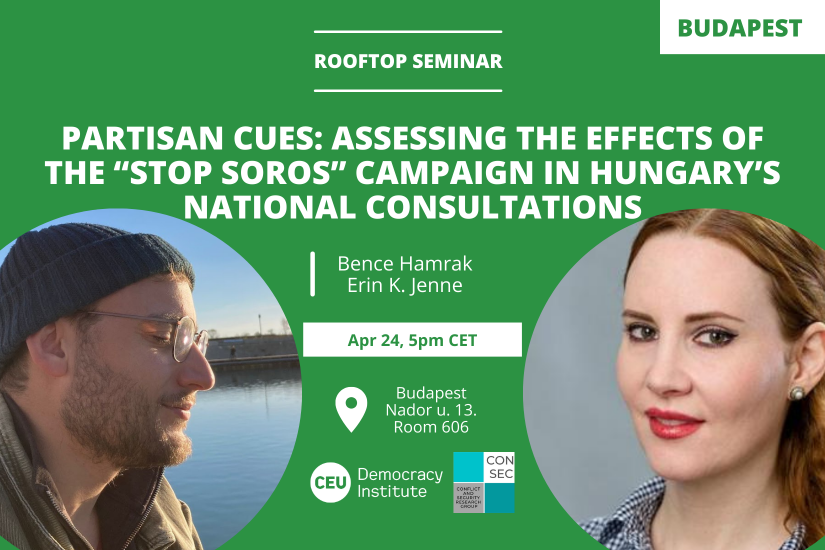
The De- and Re-Democratization Workgroup of the CEU Democracy Institute and the Conflict and Security Research Group (CONSEC) cordially invites you to its next Rooftop Seminar.
If you would like to attend, please register here.
Please keep in mind that external guests will not be able to enter the building without prior registration.
Right-wing leaders from Brazilian President Jair Bolsonaro to Russian President Vladimir Putin have long villified billionaire philanthropist George Soros in their political rhetoric, warning that he and his organizations are corrosive to the nation. Of all these leaders, however, Hungary's Viktor Orban has a singularly intense focus on Soros, even referencing him in the governments 'national consultations.' In these non-binding referenda, the government queries the Hungarian public about issues ranging from migration policy to Covid-19 policy, occasionally asserting that George Soros supports this or that policy. We theorize that the government utilizes the figure of George Soros as a partisan cue to respondents that they should oppose a given policy. To test the effectiveness of Soros as a partisan cue, we ran a novel survey experiment in Hungary (n=2,300) to mimic the style and substance of questions on the National Consultations. Using the well-known priming technique, we randomly varied whether Soros was "cued" in questions about a series of different policies. We find that 'Soros cues' make pro-Fidesz respondents less likely to support a given policy, although the effect is not large. Using additional primes, we find that this modest effect is not related to the respondents' explicit antisemitic attitudes.
The paper is available at request from the authors, Bence Hamrak, Erin K. Jenne, and Gabor Simonovits.
Speakers:
Bence Hamrak is a PhD Candidate at Central European University, Vienna. His individual research revolves around the winners' behavior in the aftermath of elections, and the implications for social polarization. His collaborative projects focus on political scandals and voter accountability, partisan cue-taking, and the public opinion on highly contested policy areas such as drug legalization. He use experiments and other methods for causal inference in his research.
Erin K. Jenne (Stanford University, PhD) is Professor of International Relations at Central European University in Vienna, where she teaches courses on mixed methods ethnic conflict, nationalism and populism and foreign policy analysis, and Research Affiliate at the CEU Democracy Institute. Her first book, Ethnic Bargaining: The Paradox of Minority Empowerment (Cornell University Press, 2007) won Mershon Center’s Edgar S. Furniss Book Award in 2007 for making an exceptional contribution to the study of national and international security. She has published numerous book chapters and articles in International Studies Quarterly, International Affairs, Security Studies, Regional and Federal Studies, Journal of Peace Research, Civil Wars, International Studies Review, Research and Politics, Nationalities Papers and Ethnopolitics. She was an associate editor for the Journal of Foreign Policy Analysis and has served in several capacities on the Emigration, Ethnicity, Nationalism and Migration Section of the International Studies Association and the Comparative Politics Section of the American Political Science Association.
Discussant:
Pal Susanszky, PhD is a Research Fellow at the Institute for Political Science of MTA Centre for Social Sciences. His research centers on political behavior, inequalities, social movements and civic society. His work has been published in journals like Democratization, Post-Soviet Affairs, and East European Politics, among other places.
Chair:
Andreas Schedler is a Senior Research Fellow at the CEU Democracy Institute. He is the Lead Researcher of the De- and Re-Democratization Workgroup and a Visiting Professor at CEU Vienna. Before joining the CEU, he was a professor of political science at the Center for Economic Teaching and Research (cide) in Mexico City. A leading comparative scholar of democracy, democratization, and authoritarianism, he has conducted research on democratic consolidation and transition, authoritarian elections, anti-political-establishment parties, political accountability, and organized violence.